Deprecated: ltrim(): Passing null to parameter #1 ($string) of type string is deprecated in /srv/data/web/vhosts/www.elqano.com/htdocs/wp-includes/formatting.php on line 4482
Connect
Identify the colleague who can answer your questions by looking at the documents they’re working on.
Thanks to an algorithm powered by artificial intelligence, Connect automatically maps employees’ knowledge from documents available on your company’s cloud, analyzes your question and puts you in touch with colleagues who have recently worked on the subject.
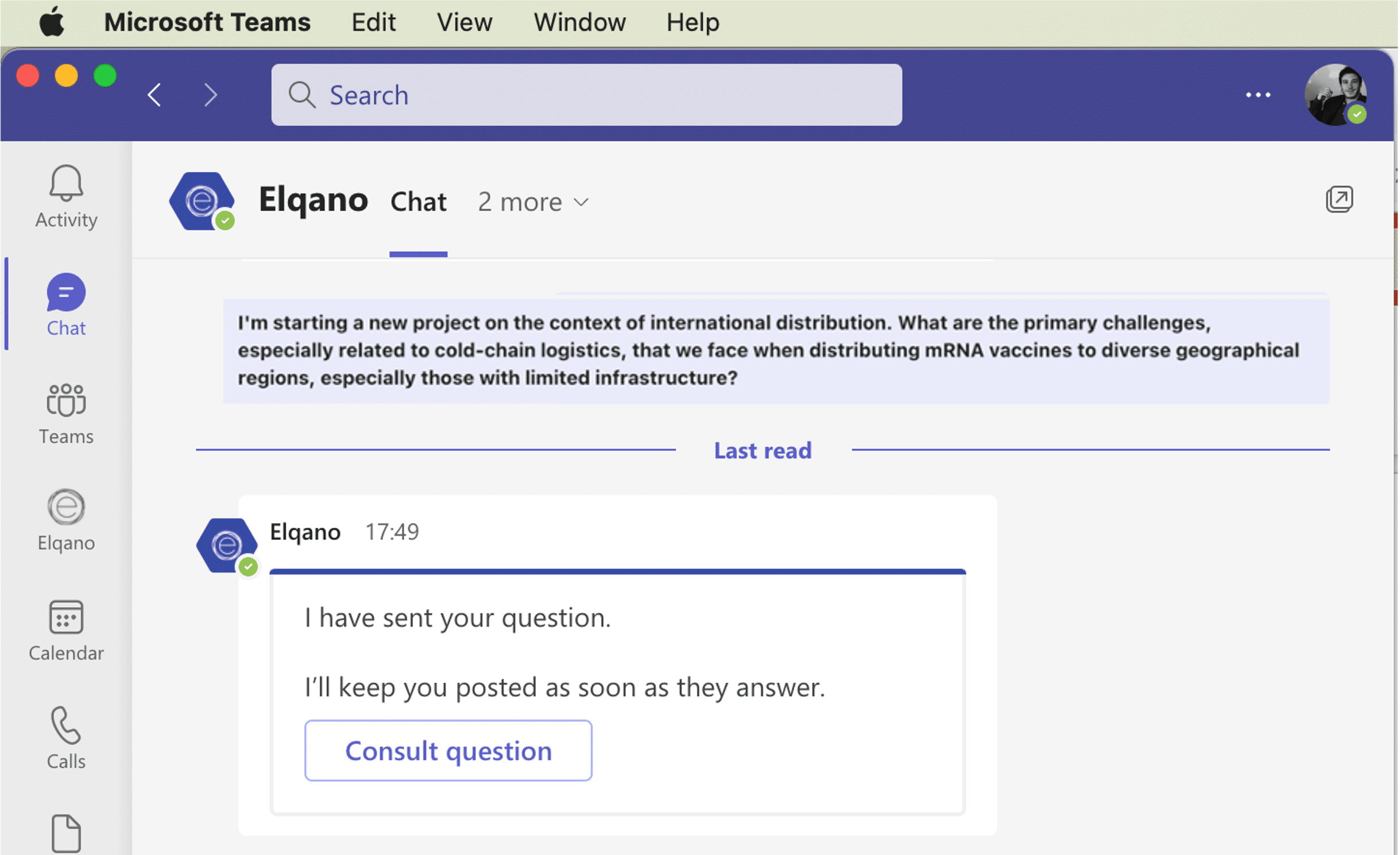
Ask your question
Looking for information?
Open Microsoft Teams to ask elqano your question.
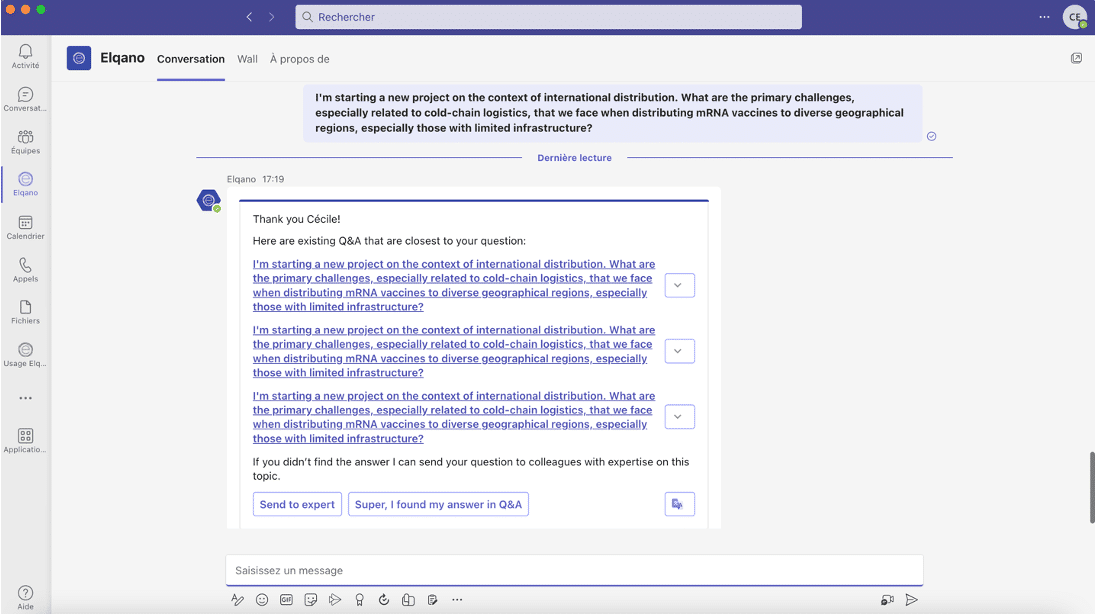
Consult the answers already provided by your colleagues
View similar questions, suggested by elqano, that have already been answered by your colleagues
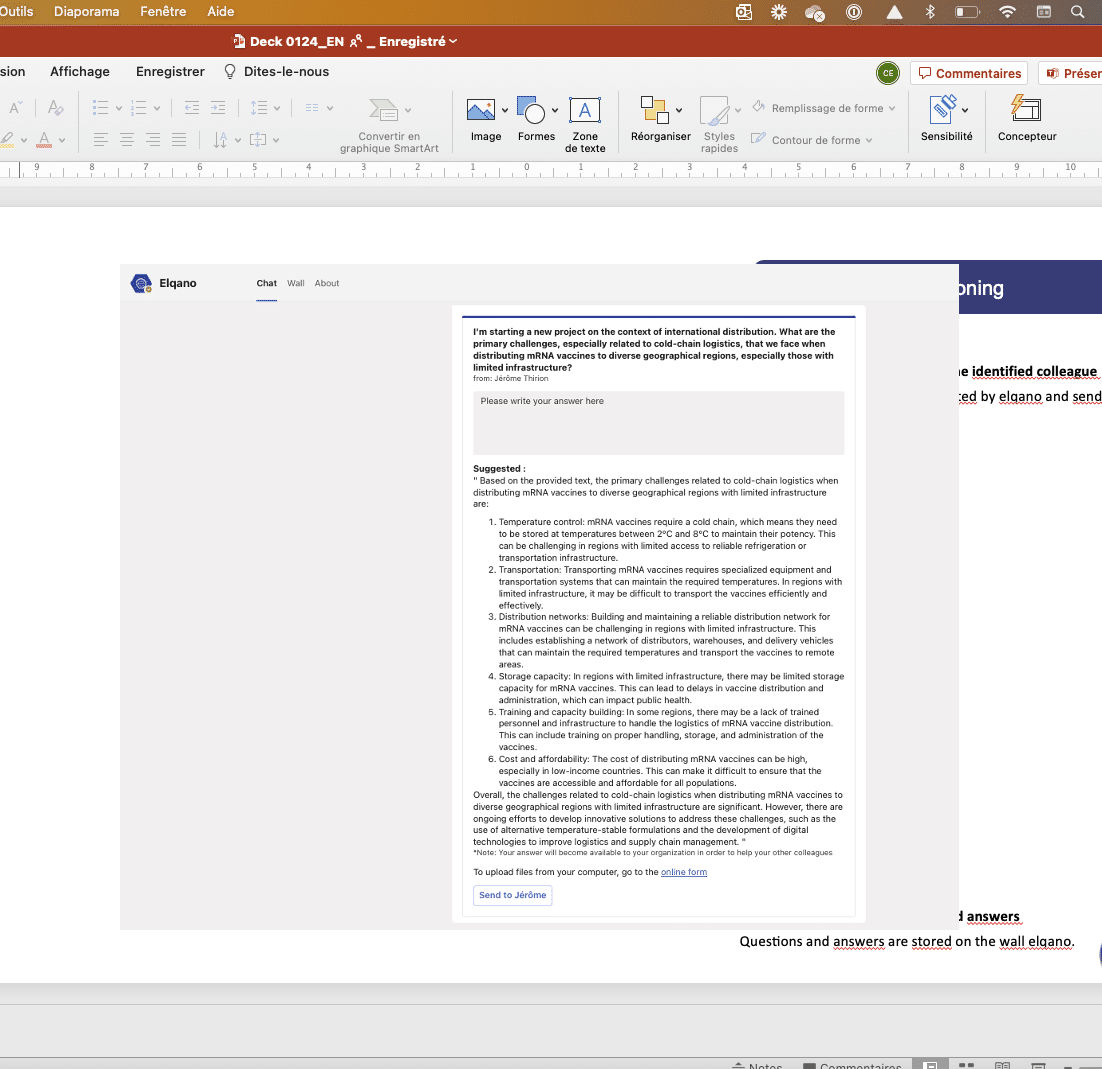
Send your question to your colleagues
If you can’t find what you’re looking for, elqano identifies the colleagues who can help you and sends them your question.
Your colleague receives a draft of answer, generated by AI based on the documents they have worked on, to help him answer.
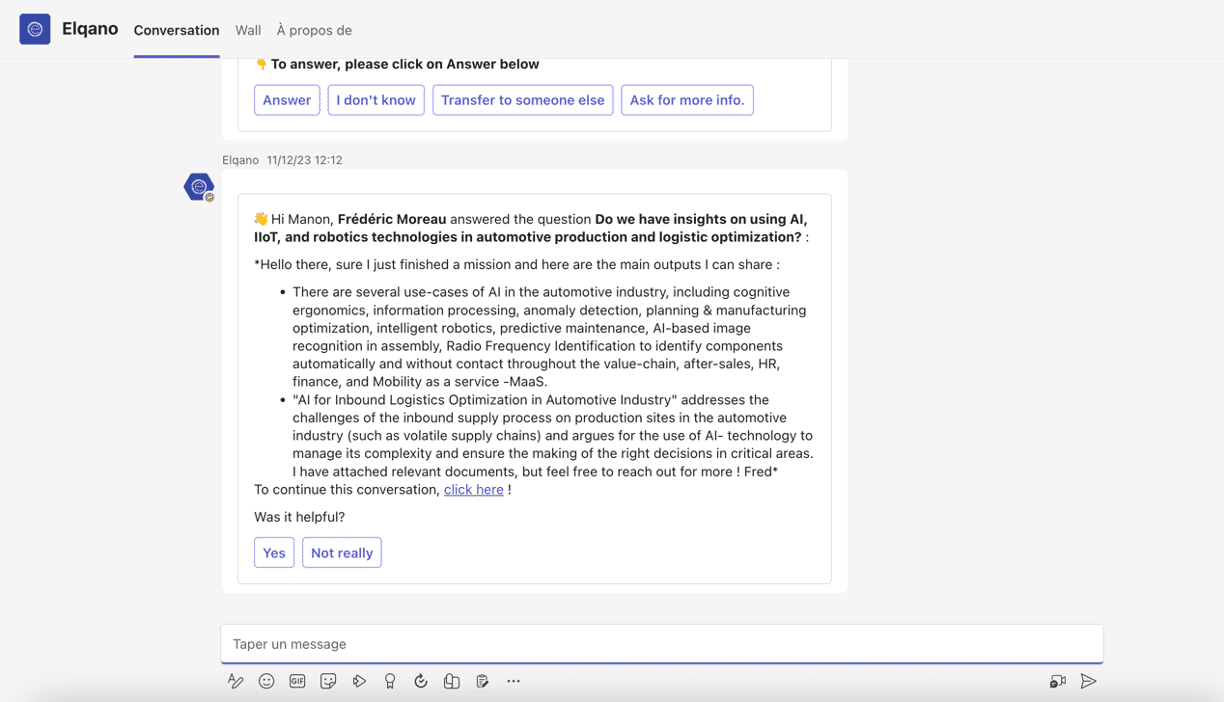
Get answers from your colleagues
Easy response directly in chat with elqano. Your colleagues can reply and share documents pre-selected by elqano.
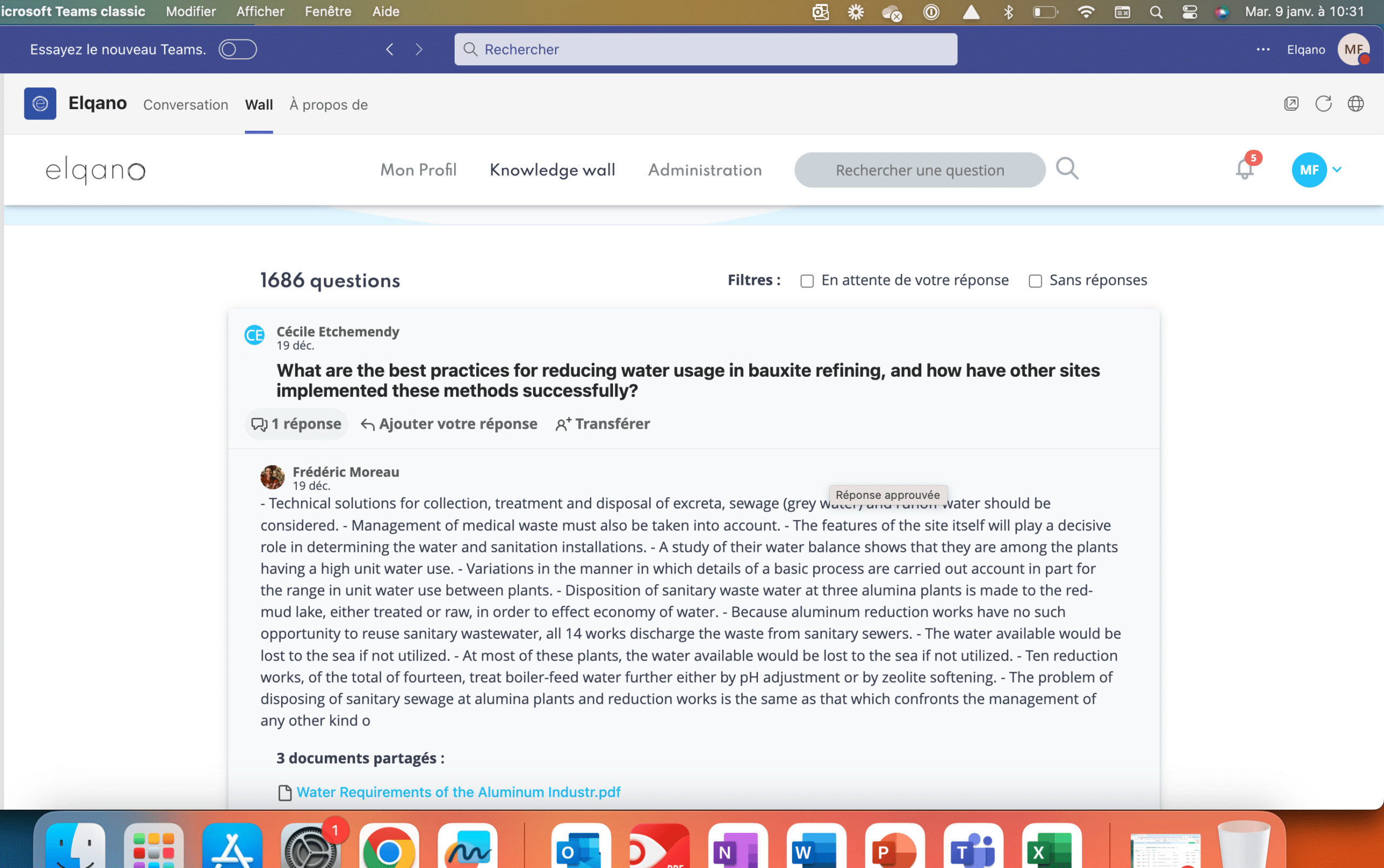
Access all questions and answers
Questions and answers are stored on the Wall elqano. Anyone can consult, comment and vote on them at any time.
Integrating Microsoft Teams, directly into the employee’s work environment, without declarative effort, elqano encourages onboarding and adoption of the solution.

That’s the average amount of time your employees waste searching for information they can’t find.
*According to a McKinsey study
corporate knowledge is tacit and not capitalized on, and is therefore lost through turnover and retirements

“A lot of lost knowledge quickly resurfaces. We were even surprised to see how the solution – thanks to document analysis – now perfectly understood our consultants’ requirements.”
Your data is safe
You control your data
Access and control
RGPD Compliant
FAQ
What is knowledge management?
Corporate knowledge management can be described as the process of efficiently and strategically acquiring, organizing, storing, sharing and using employee information and knowledge to improve overall business performance.
More concretely, knowledge management is based on collecting and making available key information to employees, promoting collaboration and knowledge sharing, and setting up systems to guarantee the quality and reliability of information. Knowledge management helps companies to maximize the sharing and use of employees’ knowledge, thereby improving their skills, decision-making and ability to innovate in problem-solving.
What are the benefits of knowledge management?
Knowledge management can bring many benefits to a company. First and foremost, it enables the centralization of information and employee knowledge. Knowledge management simplifies a company’s internal organization and processes. Employees now have faster access to information and are able to make decisions more quickly.
Banking on knowledge management is a strategy that pays off! The sharing of information between employees enhances their professional skills and promotes a work environment marked by mutual support and collaboration. As a result, employees feel more valued and attached to the company.
By storing strategic information in an organized and accessible way, knowledge management can ease the transition when an employee leaves or is replaced. Training time is also optimized, and your data is preserved over time.
What role does knowledge management play in companies?
Knowledge management plays a strategic role in business performance. It helps to improve the internal organization of teams, and is primarily based on knowledge sharing. Once the knowledge of each employee has been collected, knowledge management unlocks access to certain information. In this way, employees can consult a whole host of documents that contribute to improving their professional skills. In other words, knowledge management is a central tool for managing employees’ know-how, which in turn boosts productivity within the company.
What is the process behind knowledge management?
Behind knowledge management lies a methodological process designed to improve the development of your employees’ skills. Here are the details of this process:
Step 1: identifying usable information.
The first step is to gather the knowledge of each individual that could be useful in meeting the company’s needs.
Step 2: Data storage.
The information gathered is then stored in an IT system database.
Step 3: disseminating knowledge throughout the company.
The aim is to facilitate access to the various data stored, so that everyone can obtain the answers they need.
What are the main features of a knowledge management system?
To be effective, an employee knowledge management system must combine a whole range of functionalities. First and foremost, a knowledge management system must enable information and knowledge to be stored, organized and quickly accessed via an intuitive process. It must facilitate collaboration and sharing between users and departments, while guaranteeing the security and confidentiality of information.
The system must also offer the ability to manage access rights, and to analyze and evaluate the use and effectiveness of stored knowledge. Finally, it must be interoperable with other systems for optimal knowledge sharing.
Tacit knowledge: what’s the definition?
Tacit knowledge is intuitive, unconscious knowledge that is difficult to express or transmit verbally. This type of knowledge is often linked to experience and practice.
Tacit knowledge is highly valuable, and can be used to improve processes and internal organization. It is a key factor in problem-solving and decision-making.
What is explicit knowledge?
Explicit knowledge refers to knowledge that can be easily transmitted in writing, verbally or through technologies such as databases or knowledge management systems.
Explicit knowledge is often factual knowledge, such as information about products, processes and company policies, which can be easily documented and shared with other employees. It can include instructions, standardized processes, product and customer data, market and competitor information, etc. Explicit knowledge is often easier to formalize and share than tacit knowledge, as it can be made available in the form of documents, databases or other types of resources. Knowledge management aims to capture, store and share explicit knowledge in an efficient way to support business activities.